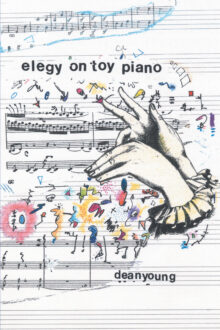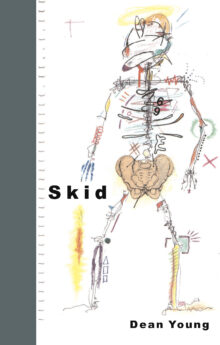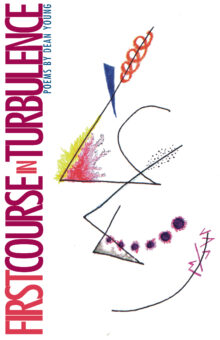
Dean Young
Dean Young has published eight previous books, most recently elegy on toy piano, a finalist for the Pulitzer Prize, and Embryoyo. He has received fellowships from the Guggenheim Foundation and the National Endowment for the Arts as well as an Academy Award in Literature from the American Academy of Arts and Letters. He teaches in the Iowa Writers’ Workshop.
Elegy On Toy Piano
In Elegy on Toy Piano, Dean Young's sixth book of poems, elegiac necessity finds itself next to goofy celebration. Daffy Duck enters the Valley of the Eternals. Faulkner and bell-bottoms cling to beauty's evanescence.
Even in single poems, Young's tone and style vary. No one feeling or idea takes precedence over another, and their simultaneity is frequently revealed; sadness may throw a squirrelly shadow, joy can find itself dressed in mourning black. As in the agitated “Whirlpool Suite”: “Pain / and pleasure are two signals carried / over one phoneline.”
In taking up subjects as slight as the examination of a signature or a true/false test, and as pressing as the death of friends, Young's poems embrace the duplicity of feeling, the malleability of perception, and the truth telling of wordplay.
Skid
Dean Young is one of the premier surrealist poets writing today. In Skid, his fifth book of poems, social outrage vies with comic excess. He embraces the autobiographical urge with fury and musically lush exclamations. Whether through the dark facts of mortality or the celebratory surprises of the imagination, these poems proclaim vitality and alertness, wasting nothing. From Wile E. Coyote and the Roadrunner’s “Meep! Meep!” to remembrances of lost loves and laments about the future, Young’s poems reveal his faith in the genius of calamity and the redemptive power of fun.
First Course In Turbulence
Finalist for ForeWord Magazine 1999 Poetry Book of the Year
With rapid shifts between subject and tone, sometimes within single poems, Dean Young’s latest book explores the kaleidoscopic welter of art and life. Here parody does not exclude the cri de coeur any more than seriousness excludes the joke. With surrealist volatility, these poems are the result of experiments that continue for the reader during each reading. Young moves from reworkings of creation myths, the index of the Norton Anthology of Poetry, pseudo reports and memos, collaged biographies, talking clouds, and worms, to memory, mourning, sexual playfulness, and deep sadness in the course of this turbulent book.



